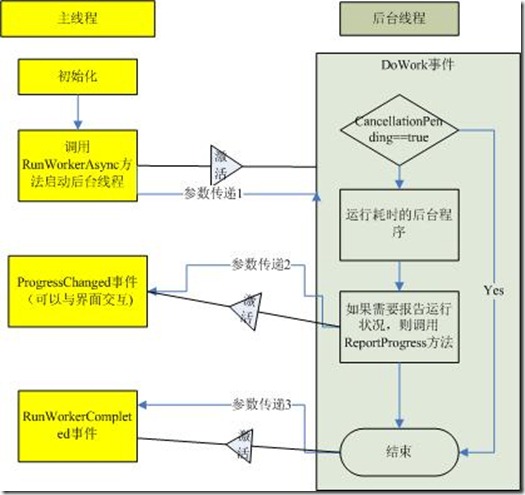线程封装组件(BackgroundWorker)和线程(Thread)
Posted tohen
tags:
篇首语:本文由小常识网(cha138.com)小编为大家整理,主要介绍了线程封装组件(BackgroundWorker)和线程(Thread)相关的知识,希望对你有一定的参考价值。
BackgroundWorker是微软的在.net Framwork中添加的一个组件,主要对线程的访问提供了一种安全的方式。简单的说就是对Thread的一次封装。
BackgroundWorker位于System.ComponentModel下,是一个继承了Component的组件,微软官方的解释为:Executes an operation on a separate thread.就是说,开始一个新的线程执行操作。

首先介绍一下BackgroundWorker的相关属性和方法:
属性:
WorkerReportsProgress:是否可以报告进度。
WorkerSupportsCancellation:是否允许异步中止。
IsBusy:是否在运行。
CancellationPending:判断BackgroundWorker是否已经异步取消。
方法:
RunWorkerAsync:开始执行任务。触发DoWork事件
ReportProgress:异步提醒,触发ProgressChanged事件,但是这个如果可以使用,必须设置WorkerReportsProgress为True
CancelAsync:取消BackgroundWorker操作。
事件:
DoWork:执行RunWorkerAsync后触发,异步执行的认为。
ProgressChanged:执行ReportProgress时触发,异步获得进度。
RunWorkerCompleted:线程结束时触发,主要有成功结束,发生异常或者取消时发生。
Thread相对来说就简单了,但是使用起来就比较麻烦了。Thread位于System.Threading的名空间下,是一个可以独立创建和操作一个线程,并且对线程进行设置优先级和获得状态的一个不可继承的类。
下面是我做的一个例子,来比较他们两个的使用。
建立一个窗体,放置了两个TextBox,分别为设置开始和结束的Progree的值,放置两个ProgressBar,分别设置为线程的Progressbar和BackGroundWorker的ProgressBar。另外放置按钮为StartBackGroundWorker,StartThread,CancelBackGroundWorker,CancelThread和PauseThread。
BackGroundWorker的使用就非常简单:
/// <summary> /// Handles the Click event of the btnBackGroundWorker control. /// </summary> /// <param name="sender">The source of the event.</param> /// <param name="e">The <see cref="System.EventArgs"/> instance containing the event data.</param> private void btnBackGroundWorker_Click(object sender, EventArgs e) { StartFrom = Convert.ToInt32(txtStart.Text); EndTo = Convert.ToInt32(txtEnd.Text); progressBarThread.Minimum = StartFrom; progressBarThread.Maximum = EndTo; this.btnBackGroundWorker.Enabled = false; this.backgroundWorker.RunWorkerAsync(); } /// <summary> /// Handles the DoWork event of the backgroundWorker control. /// </summary> /// <param name="sender">The source of the event.</param> /// <param name="e">The <see cref="System.ComponentModel.DoWorkEventArgs"/> instance containing the event data.</param> private void backgroundWorker_DoWork(object sender, DoWorkEventArgs e) { for (int nValue = StartFrom; nValue <= EndTo; nValue++) { if (this.backgroundWorker.CancellationPending) { e.Cancel = true; return; } this.backgroundWorker.ReportProgress(nValue); Thread.Sleep(200); } } /// <summary> /// Handles the ProgressChanged event of the backgroundWorker control. /// </summary> /// <param name="sender">The source of the event.</param> /// <param name="e">The <see cref="System.ComponentModel.ProgressChangedEventArgs"/> instance containing the event data.</param> private void backgroundWorker_ProgressChanged(object sender, ProgressChangedEventArgs e) { this.prgProcessBackGroundWorker.Value = e.ProgressPercentage; } /// <summary> /// Handles the RunWorkerCompleted event of the backgroundWorker control. /// </summary> /// <param name="sender">The source of the event.</param> /// <param name="e">The <see cref="System.ComponentModel.RunWorkerCompletedEventArgs"/> instance containing the event data.</param> private void backgroundWorker_RunWorkerCompleted(object sender, RunWorkerCompletedEventArgs e) { // 取消 if (e.Cancelled) { MessageBox.Show("Cancelled"); } // 出现错误 else if (e.Error != null) { MessageBox.Show(e.Error.Message + Environment.NewLine + e.Error.StackTrace); } // 完成 else { MessageBox.Show("Completed"); this.btnBackGroundWorker.Enabled = true; } } /// <summary> /// Handles the Click event of the btnCancelBackgroundWoker control. /// </summary> /// <param name="sender">The source of the event.</param> /// <param name="e">The <see cref="System.EventArgs"/> instance containing the event data.</param> private void btnCancelBackgroundWoker_Click(object sender, EventArgs e) { this.backgroundWorker.CancelAsync(); }
Thread的使用就比较麻烦了,对于尤其是对异步提醒来说,需要写委托,代码量是很多,但是对于BackgroundWorker来说,却没有线程暂停和继续的方法。但是对于一般的来说,这些功能也是不用的,而且在微软的文档中还提到了,Thread的Resume和Suspend已经不推荐使用。
// 声明委托 delegate void DelegateType(int x); DelegateType TheDelegate; // ProgressBar的开始和结束值 int StartFrom, EndTo; // 是否线程暂停 bool IsThreadPaused; ManualResetEvent CancelEvent = new ManualResetEvent(false); Thread MyThread; /// <summary> /// 委托的消息事件 /// </summary> /// <param name="nProgress">进度值</param> private void MessageHandler(int nProgress) { lblThreadStatus.Text = "处理: " + Convert.ToString(nProgress); progressBarThread.Value = nProgress; if (nProgress == progressBarThread.Maximum) { MessageBox.Show("Completed"); this.btnTread.Enabled = true; } } /// <summary> /// Handles the Click event of the btnTread control. /// </summary> /// <param name="sender">The source of the event.</param> /// <param name="e">The <see cref="System.EventArgs"/> instance containing the event data.</param> private void btnTread_Click(object sender, EventArgs e) { TheDelegate = MessageHandler; StartFrom = Convert.ToInt32(txtStart.Text); EndTo = Convert.ToInt32(txtEnd.Text); progressBarThread.Minimum = StartFrom; progressBarThread.Maximum = EndTo; btnTread.Enabled = false; IsThreadPaused = false; MyThread = new Thread(ProcessRoutine); MyThread.Start(); } /// <summary> /// Processes the routine. /// </summary> private void ProcessRoutine() { for (int nValue = StartFrom; nValue <= EndTo; nValue++) { // 判断是否取消 if (CancelEvent.WaitOne(0, false) == true) { return; } this.BeginInvoke(this.TheDelegate, nValue); Thread.Sleep(200); } } /// <summary> /// Handles the Click event of the btnCancelThread control. /// </summary> /// <param name="sender">The source of the event.</param> /// <param name="e">The <see cref="System.EventArgs"/> instance containing the event data.</param> private void btnCancelThread_Click(object sender, EventArgs e) { btnCancelThread.Enabled = false; btnPauseThread.Enabled = false; CancelEvent.Set(); MyThread.Join(); } /// <summary> /// Handles the Click event of the btnPauseThread control. /// </summary> /// <param name="sender">The source of the event.</param> /// <param name="e">The <see cref="System.EventArgs"/> instance containing the event data.</param> private void btnPauseThread_Click(object sender, EventArgs e) { // Bad approach! if (!IsThreadPaused) { IsThreadPaused = true; MyThread.Suspend(); btnPauseThread.Text = "Resume Thread"; // Disallow Cancel btnCancelThread.Enabled = false; } else { IsThreadPaused = false; MyThread.Resume(); btnPauseThread.Text = "Pause Thread"; btnCancelThread.Enabled = true; } }
比较起来,两个是完全相同的,对于Thread来说,灵活性就比较好了,BackgroundWorker的使用就相对来说简单了。
以上是关于线程封装组件(BackgroundWorker)和线程(Thread)的主要内容,如果未能解决你的问题,请参考以下文章